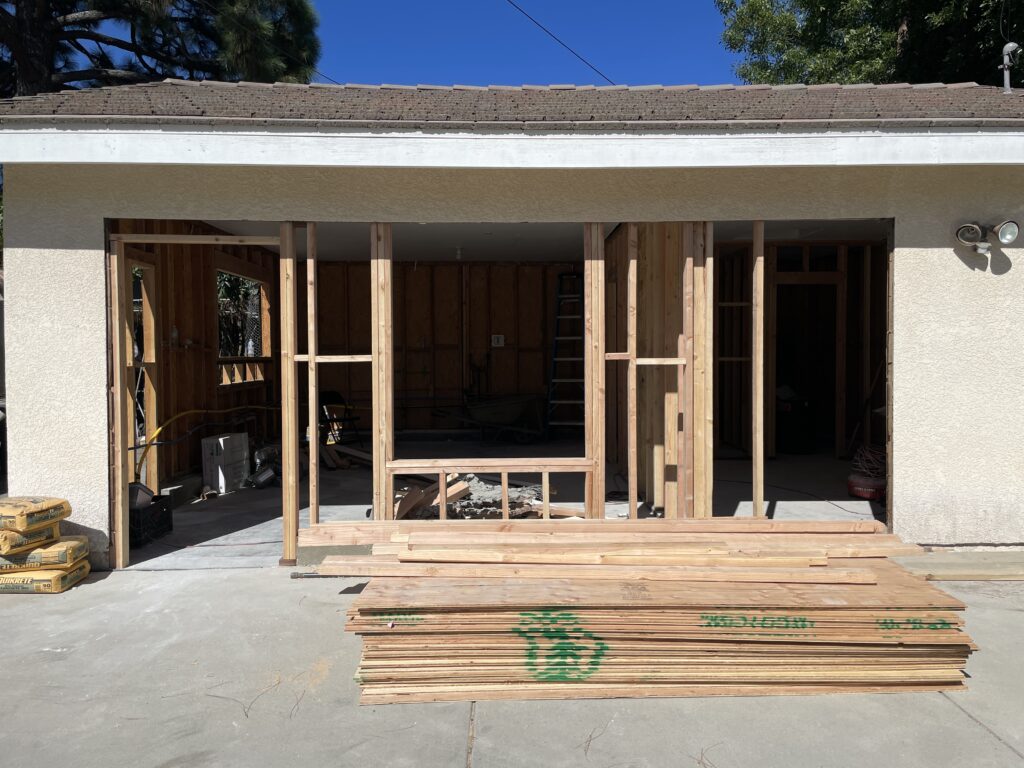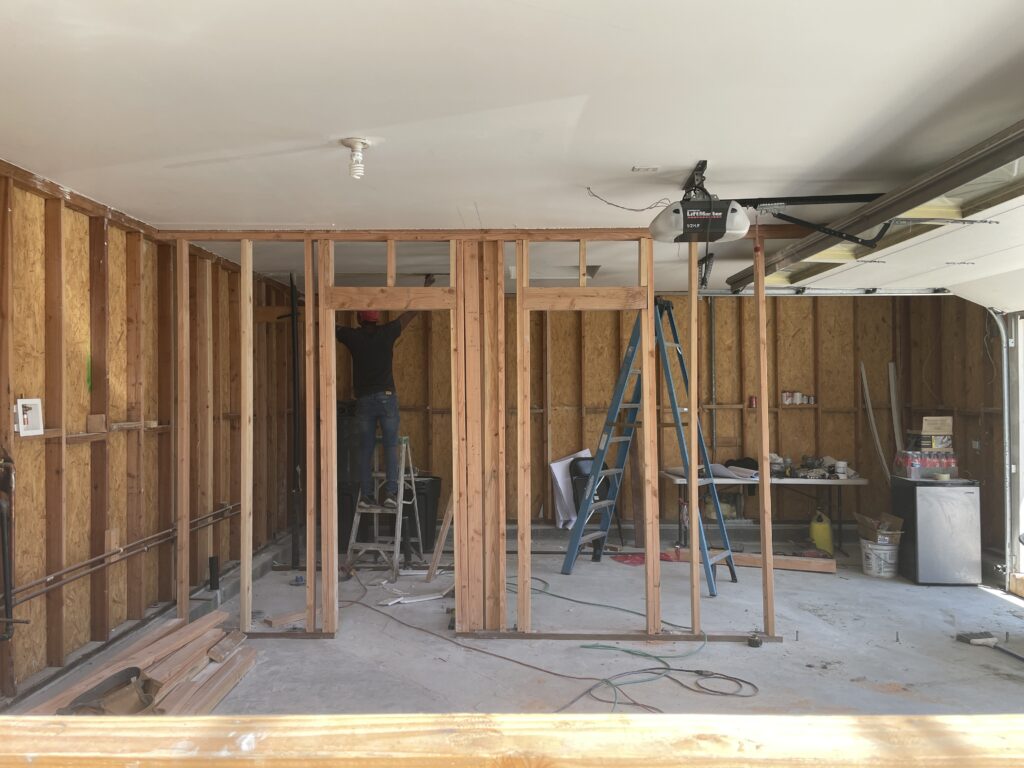Our house property came with an extra 2-car garage that we’d used for storage for a number of years. Not a great use of space. Knowing it’d be a huge financial undertaking, we kept putting off the idea of converting it into an ADU. For us, this ADU would be considered a dedicated play space for our kids and friends and a guest house when needed. After much nudging (from Sherry), we finally began the process by hiring an architect. (We’ll dive into the process in another blog piece coming soon.) Once the ball got rolling, the process was ongoing, even with a huge break in between getting architectural plans approved and then signing with a contractor to begin construction. Architectural plans do expire, so that kept us going even when we wanted to take a longer financial break. Alas, we made it through and have been thoroughly enjoying our ADU since completion. Totally worth it. If you’re in the market for a contractor, especially an ADU, we hope sharing our quotes (and eventually our process) helps.
General Scope of Work:
525 sq ft Detached Garage 1 BR/1BA with a walk-in closet.
New sewer line, gas line, and electrical line (Gas line is 100 feet+ from ADU to the meter, so this requires lots of digging).
Choosing a general contractor (GC) is the most important part of the ADU Process. We were looking for the best value and evaluated our GC based on cost, reliability, trust and communication. We searched online and asked around for referrals: through our architect whom we hired to draw up our plans, friends, Yelp/Home Advisor, etc. After much research, we reached out to and received quotes from 5 different GCs.

We performed due diligence on each contractor: checking their GC license, workers comp, visited their existing projects (if applicable), online reviews, company information (if applicable), etc. We learned that some GCs provide estimates just for labor or include/exclude certain items. For instance, one GC clarified in the estimate that the owner is responsible for purchasing tiles, flooring, countertops, etc. Other GCs include these in their estimate as they would purchase the items on our behalf. So, take these into consideration when comparing proposals. They’re not all apples to apples, and the exclusions may incur a huge price difference (a much higher end cost).
We had no interest in being another data point for having a bad contractor experience, so making a well-informed decision was paramount. As we had these back-and-forth conversations, along with initial in-person site visits on our property, we ultimately evaluated each contractor based on these key factors:
Cost: Price per Sq Ft. Material inclusions/exclusions. Overall estimate.
Reliability: Proper licensing (if in CA, you can check here). Portfolio of completed projects. Years of experience.
Trust: Reviews. Consistency in what they communicate. Honesty about the potential challenges or issues that may come up (i.e. potential foundation work, long distance to gas meter, etc.) and the costs that may incur on top of the initial estimate. Established rapport if it’s a friend or someone we know.
Communication: Responsiveness. Professionalism. Provides clarity during the Q&A process.
Below is a list of GCs we inquired, along with our subjective ratings. Costs include materials and don’t include appliances.
John: 4.6 stars on Yelp. GC + licensed electrician. Great communicator. Very knowledgeable and detail-oriented. We were able to see some of his recent and current projects.
- Cost: $131,250
- Reliability: 9/10
- Trust: 9/10
- Communication: 9/10
Why we passed: He gave a blanket quote of $250 PSF. We knew he was going to be good, but price was the main reason we didn’t choose him.
James: A friend. 5 stars on Yelp with very high praises. Multi-generational GC. Trained architect.
- Cost: $155,745
- Reliability: 10/10
- Trust: 10/10
- Communication: 10/10
Why we passed:
The cost. He was the most professional, organized, and communicative. (It probably helps that he’s a friend.) We momentarily considered choosing him for the “ease of mind” type of experience where everything would most likely run smoothly. If we had a high-end ground-up project, we would highly consider him. His price included mostly higher-end finishes.
Andy – Referred by a widely-publicized ADU contractor in our area.
- Cost: $105,000
- Reliability: 7/10
- Trust: 2/10
- Communication: 4/10
Why we passed:
He came the most prepared with all our plans printed out in full size – a solid first impression. However, it all went downhill from there. He took a smoke break during the site visit on our property. Although the lower cost estimate was tempting, this lack of professionalism alone almost deterred us from proceeding with him. Then, the sketchiness came. While he gave us his business name, he wouldn’t provide his contractor license when we asked; he said he would give it to us upon signing the contract. Firstly, I checked his business’ articles of incorporation and found his wife’s business instead – one that is unrelated to general contract work. Secondly, a contractor license is public information where you’d only need to input the name to see their license. By not giving us the license number until we sign the contract, that implies that he’s not willing to give us his real full name until we sign a contract to go with them. There goes the trust factor.
Andrew – Referred by our architect. Has decent online reviews. Was originally a handyman turned GC.
- Cost: $103,000. Then, $125,000. Then, $110,000 (when we said we’d pass and he brought the cost down again).
- Reliability: 4/10
- Trust: 5/10
- Communication 8/10
Why we passed:
We initially decided to go with Andrew. His initial price was excellent, and he was responsive via text and sent over a professional proposal using Buildertrend. Definitely the most tech-savvy contractor we’d spoken with. He had an online presence and decent reviews. He invited us to see a current project nearby, so we did. He disclosed that this project was delayed by many months (stating various reasons), which is understandable in the world of construction. We were already prepared to deal with these inconveniences and potential delays.
As we were about to sign, he updated the quote to $125,000. We pushed back, and we settled on $110,000. His explanation was to have a buffer for future change orders. He sent us the deposit and payment schedule, which was pay based on a timeline instead of completed milestones. For example, we would have to pay him $10k every week instead of paying him after certain work is completed (i.e. demo, plumbing, electrical completed). Theoretically, he can work one day and skip the rest of the month and we are required to pay for the whole month. Knowing that his existing project had extensive delays, there’s a high chance that we would be required to pay him all the payment before even half the project is finished. We weren’t comfortable with that type of structure and lack of accountability.
Peter – Our friend’s dad. 30+ years’ GC/construction experience. No online presence or reviews.
- Cost: $102,000
- Reliability: 7 for GC, 10 for his worker.
- Trust: 10, because of friend 😊
- Communication: 5/10
Why YES: After not going with Andrew, we decided to reach out to a friend’s dad. Peter is no frills, communicates minimally, and would be an all-functional type of relationship. He wanted to give us a quote without visiting the property, but we insisted for him to come and check it out. He probably came and went in about 5-10 minutes. He’s the type that works off of handshake and agreement/contract is just a piece of paper.
We chose Peter because we felt comfortable with his no frills, all-function attitude, and he offered the lowest price. He initially quoted lower but adjusted the quote after realizing how much they needed to dig to add the gas line. Our friend was comfortable being the liaison including drafting the contract for us. Since he didn’t have any reviews or online presence, our friend was proxy for trust and reliability, and we all felt comfortable with the arrangement. The payment schedule was based on each passing inspection and construction milestones, which we were comfortable with. His only term: Cash only. So, I made cash receipts for each payment and took many trips to the bank.

The verdict:
We made the right decision with minimal hiccups. We came in with proper expectations, and they delivered. We made some modifications, including adding an additional window from a fully enclosed wall. The architect advised strongly against it because of the time and cost to add the window, but our GC just did it without incurring an extra cost. I’d imagine it be a $2-$3k+ change order fee had we used a different contractor. There were many minor requests that he would fulfill without question or cost. No frills.
Our initial project timeline was 3-4 months to completion. However, we did experience some delays because we had to go back to the architect in the middle of the project to make some changes in order to pass inspections. And in the process, we added some other minor changes – all of which led to about a month without any construction work. Not Peter’s fault. It was a waiting process – for our architect, the city, back to the architect, and lots of in-between communication.
Once we surpassed the expected completion date without actual project completion, Peter was much less communicative, and we didn’t know what days to expect them at our ADU. They could show up for a day and be gone for a week. We were okay with it, especially since we didn’t have to pay the installments until each milestone was completed. Also, we understood their labor constraints when they had co-current projects at the time.
Overall, we’re quite happy with the craftsmanship and quality. It ended up a little better than our expectations, mostly credited to Sherry’s design eye and color choices for the cabinets, doors, vanity, and accent colors. We ended up having to DIY a little bit at the end, performing some loose ends work ourselves.
Construction ended up taking about 6 months to be functional with electricity. Two months afterwards, we got final approval and full certificate of occupancy, along with the gas turned on.
If professionalism, organization, structure, communication, ease of mind, timeliness, and high-end material and finishes are most important, then John or James would be the better options. It would, however, cost $30,000-$50,000 more. For us, I don’t think the extra money spent on them would add the equivalent value.

We believe we got the best value for our ADU, which we set out to achieve in our initial search for a GC. Below is the layout of our agreement: simple and succinct.

Side notes for big purchase optimization:
We opened a new Chase credit card in anticipation of paying for large personal items for the ADU. The bonus and referral bonus totaled 115,000 chase points. There was a 5x bonus spend on office supplies, so we went to Staples and bought $4,000 worth Visa gift cards with no fees. That gave us an extra 20,000 points. We then used those gift cards to buy our appliances and T.V.
By transferring the points to an airline such as Virgin Atlantic when they have 30% transfer bonus, the points accrued from this credit card optimization was enough for almost 2 round trip business class tickets to Paris (retail for $20,000+). So, with a little planning and optimization, applying for just 1 card, a few trips to Staples, and paying for our personal ADU items, this got us an amazing trip to Paris.
Financial benefit of our ADU:
The market valuation of an ADU is simply calculated as an extension of the main property, since it’s added to the square footage of the main property in how sellers and brokers market the property. Since the market price of our surrounding area is $600+ PSF, and our ADU is 525 SF, then the additive value to our property is ($600 x 525) $315,000. With our all-in cost around $121,000, we built around $200,000 in additional equity to our home.
If we were to rent it, the market rent for our ADU is $1800+. The return on investment ([$1800*12]/$121,000) is around 18%. In real estate, that’s an excellent return without leverage.